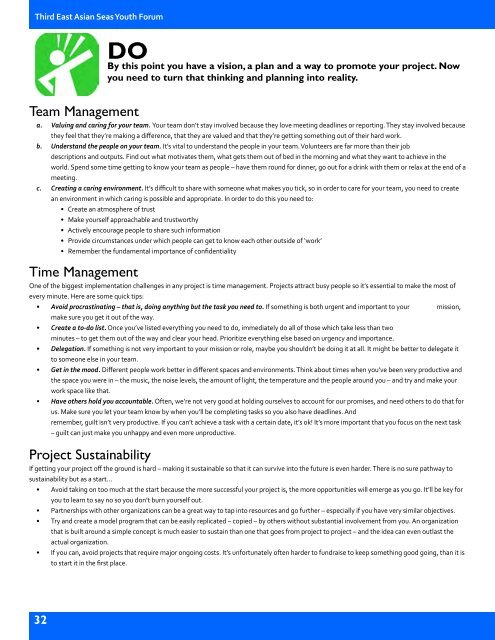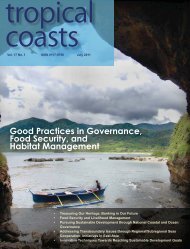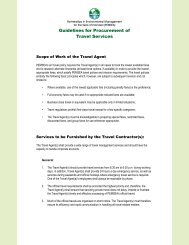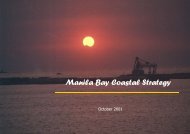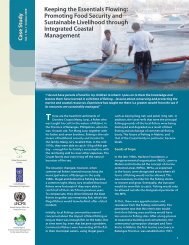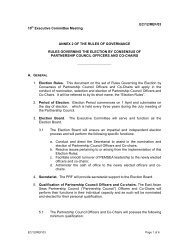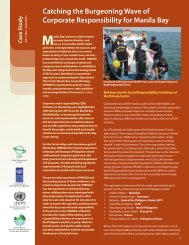Third East Asian Seas Youth Forum Toolkit - PEMSEA.org
Third East Asian Seas Youth Forum Toolkit - PEMSEA.org
Third East Asian Seas Youth Forum Toolkit - PEMSEA.org
- No tags were found...
You also want an ePaper? Increase the reach of your titles
YUMPU automatically turns print PDFs into web optimized ePapers that Google loves.
<strong>Third</strong> <strong>East</strong> <strong>Asian</strong> <strong>Seas</strong> <strong>Youth</strong> <strong>Forum</strong>DOBy this point you have a vision, a plan and a way to promote your project. Nowyou need to turn that thinking and planning into reality.Team Managementa. Valuing and caring for your team. Your team don’t stay involved because they love meeting deadlines or reporting. They stay involved becausethey feel that they’re making a difference, that they are valued and that they’re getting something out of their hard work.b. Understand the people on your team. It’s vital to understand the people in your team. Volunteers are far more than their jobdescriptions and outputs. Find out what motivates them, what gets them out of bed in the morning and what they want to achieve in theworld. Spend some time getting to know your team as people – have them round for dinner, go out for a drink with them or relax at the end of ameeting.c. Creating a caring environment. It’s difficult to share with someone what makes you tick, so in order to care for your team, you need to createan environment in which caring is possible and appropriate. In order to do this you need to:• Create an atmosphere of trust• Make yourself approachable and trustworthy• Actively encourage people to share such information• Provide circumstances under which people can get to know each other outside of ‘work’• Remember the fundamental importance of confidentialityTime ManagementOne of the biggest implementation challenges in any project is time management. Projects attract busy people so it’s essential to make the most ofevery minute. Here are some quick tips:• Avoid procrastinating – that is, doing anything but the task you need to. If something is both urgent and important to your mission,make sure you get it out of the way.• Create a to-do list. Once you’ve listed everything you need to do, immediately do all of those which take less than twominutes – to get them out of the way and clear your head. Prioritize everything else based on urgency and importance.• Delegation. If something is not very important to your mission or role, maybe you shouldn’t be doing it at all. It might be better to delegate itto someone else in your team.• Get in the mood. Different people work better in different spaces and environments. Think about times when you’ve been very productive andthe space you were in – the music, the noise levels, the amount of light, the temperature and the people around you – and try and make yourwork space like that.• Have others hold you accountable. Often, we’re not very good at holding ourselves to account for our promises, and need others to do that forus. Make sure you let your team know by when you’ll be completing tasks so you also have deadlines. Andremember, guilt isn’t very productive. If you can’t achieve a task with a certain date, it’s ok! It’s more important that you focus on the next task– guilt can just make you unhappy and even more unproductive.Project SustainabilityIf getting your project off the ground is hard – making it sustainable so that it can survive into the future is even harder. There is no sure pathway tosustainability but as a start…• Avoid taking on too much at the start because the more successful your project is, the more opportunities will emerge as you go. It’ll be key foryou to learn to say no so you don’t burn yourself out.• Partnerships with other <strong>org</strong>anizations can be a great way to tap into resources and go further – especially if you have very similar objectives.• Try and create a model program that can be easily replicated – copied – by others without substantial involvement from you. An <strong>org</strong>anizationthat is built around a simple concept is much easier to sustain than one that goes from project to project – and the idea can even outlast theactual <strong>org</strong>anization.• If you can, avoid projects that require major ongoing costs. It’s unfortunately often harder to fundraise to keep something good going, than it isto start it in the first place.32


